Click to view and download PDF version.
Background
As part of the Next 150 University of Illinois Strategic Plan, the University invested in the social and behavioral science community and elevated the Social and Behavioral Science Research Initiative (SBSRI) to become the Center for Social and Behavioral Science (CSBS).
In order to implement the goals outlined in the strategic plan for the social and behavioral sciences, CSBS surveyed social and behavioral science faculty during the fall of 2019. This survey had two objectives: 1) to assess faculty views on what activities CSBS should prioritize, and 2) to gather information about faculty and how CSBS can help these faculty in their research enterprise.
The survey was sent to 1,691 faculty members in early November 2019 and officially closed in mid-December 2019. The faculty included in the survey were tenure-track faculty members and non-tenure-track faculty members (e.g. lecturers, adjuncts, clinical), who spanned across 49 academic units, including the Deans of all 12 colleges/schools.[1] Individuals not included in the survey were emerita faculty, post-docs, and academic professionals. Response rate was quite low with only 138 faculty completing the survey
The survey instrument addressed five main topics: 1) what CSBS should prioritize to help the social and behavioral science community, 2) how previous experiences working with SBSRI/CSBS had been, 3) how CSBS should communicate with the social and behavioral science community, 4) what the research interests of the CSBS community are, and 5) what other activities CSBS could implement to serve the CSBS community. Results are presented in the following sections.
Results
CSBS Priorities
The survey asked social and behavioral faculty to rate the importance of different CSBS priorities from “1 = Not at all important” to 3= “Somewhat important” and “5 = Very important.” In particular, the survey included goals related to 1) funding assistance, 2) research facilitation, 3) proposal support, and 4) community engagement.
I. Funding Assistance
For funding assistance priorities, faculty were asked to rate the importance of 1) providing research seed funding for research teams to collect pilot data, 2) identifying potential grant proposals for social and behavioral science faculty, and 3) bringing funders such as NSF program officers to campus to meet with interested faculty.
The highest priority identified was “provide seed funding”, with 88% of responses ranking this as very important or important and only 2% as not important or not at all important. “Identify grants” followed with 77% of respondents categorizing this as very important or important and 4% as not important or not at all important. “Bring funding agencies to campus” was ranked lowest: only 69% categorized this as very important or important, 22% as somewhat important, and 9% as not important or not at all important. These results are depicted in Figure 1.
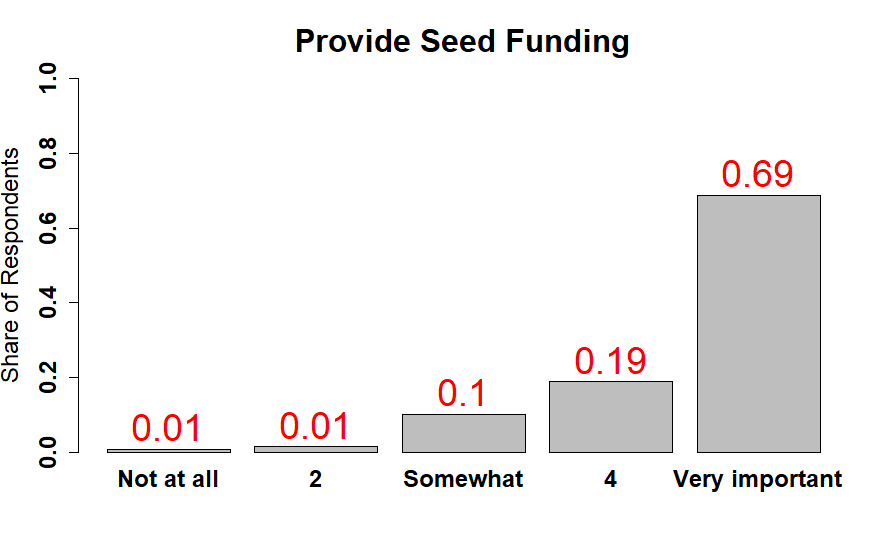
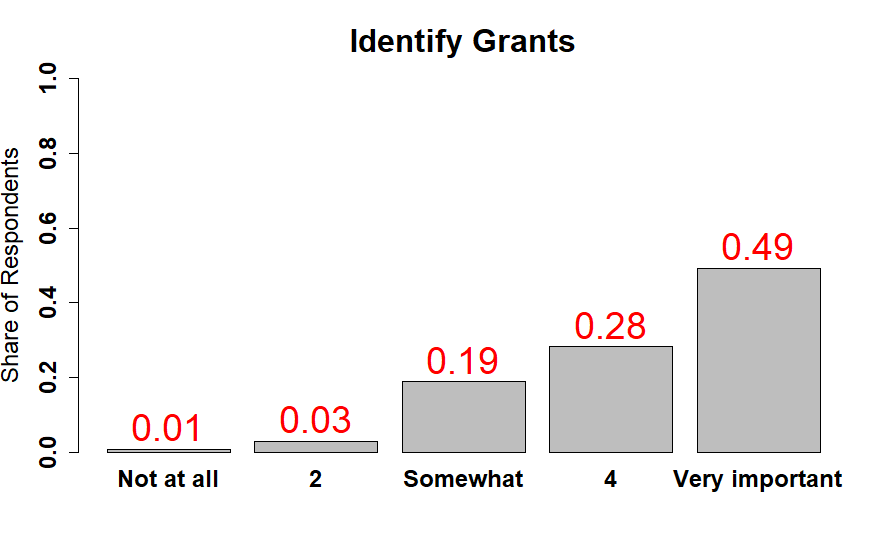
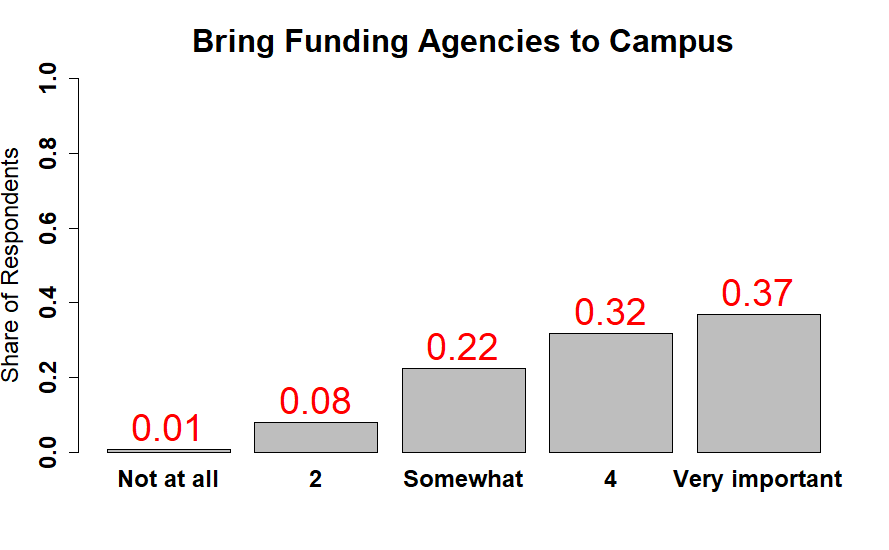
Figure 1. The share of respondents who ranked the importance for each funding assistance area from “0 = Not at all important” to “5 = very important”.
II. Research Facilitation
For research facilitation priorities, faculty were asked to rate the importance of 1) helping mentor new social and behavioral science faculty on the grant proposal process, 2) helping social and behavioral science faculty find interdisciplinary collaborators on campus, 3) facilitating a mentee-mentor program for those seeking external funding opportunities, and 4) cultivating research teams to focus on applying for large funding mechanisms such as Center and Program grants.
“Mentor new faculty” and “identify interdisciplinary collaborators” were the top two areas that received similar support. 77% of faculty ranked “mentor new faculty” as very important or important and 75% ranked “identify collaborators” as very important or important. “cultivate research teams” followed with 72% of respondents categorizing it as very important or important and 12% as not important or not at all important. The “mentee-mentor program” area was ranked last, with 59% ranking it as very important or important and 16% as not important or not at all important. These results are depicted in Figure 2.
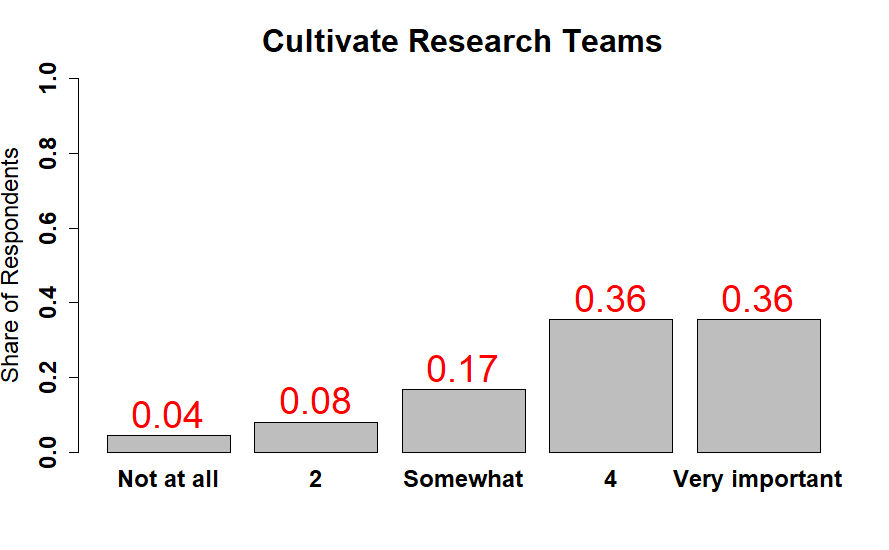
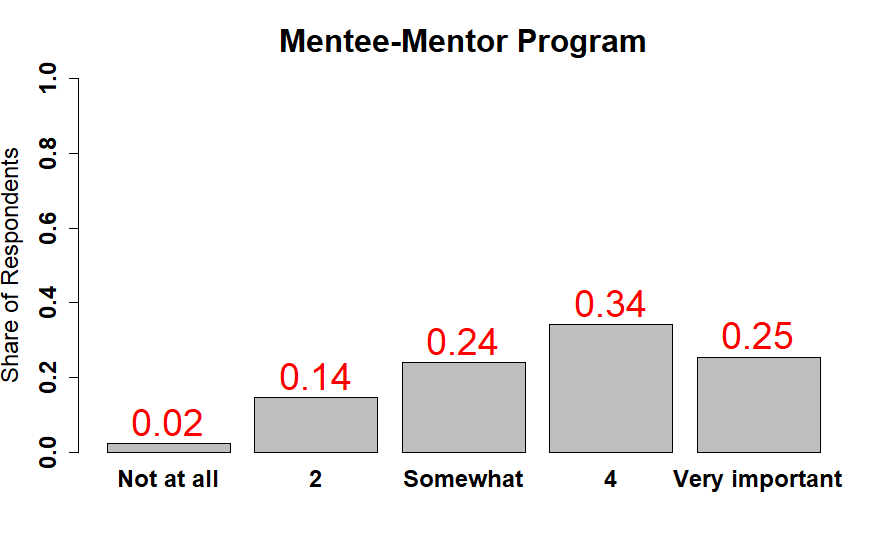
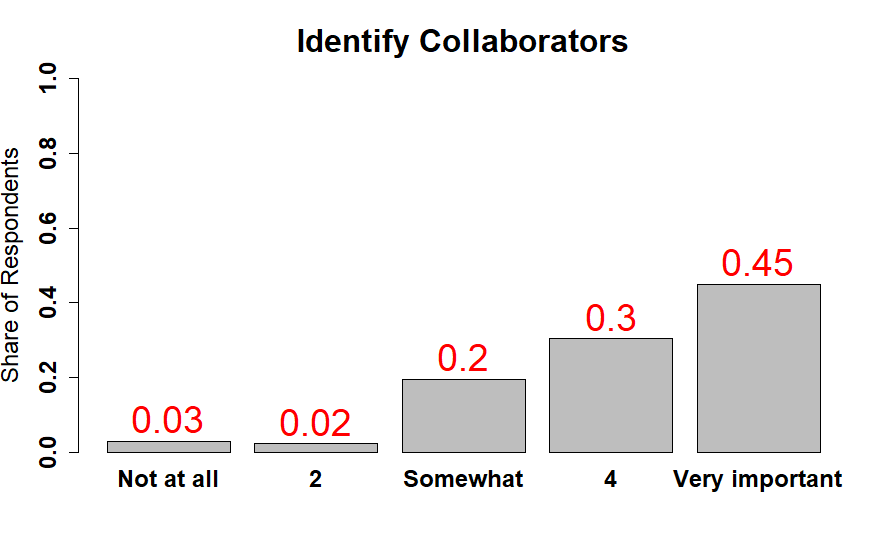
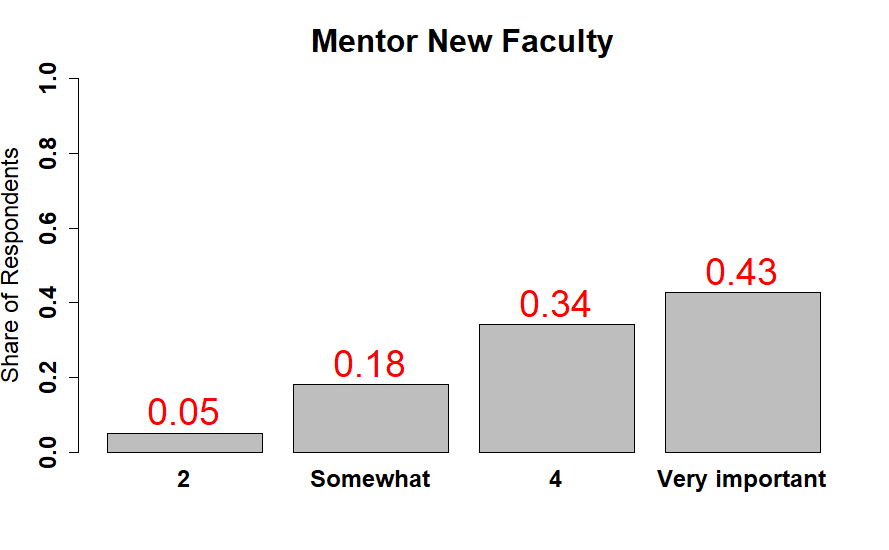
Figure 2. The share of respondents who ranked the importance for each research facilitation area from “0 = Not at all important” to “5 = very important”.
III. Proposal Support
For proposal support priorities, faculty were asked to rate the importance of 1) helping with proposal development, 2) conducting workshops on how to apply for NIH, NSF, and other federal-level grants, and 3) creating a registry of completed grant proposals that researchers can use as examples.
Out of the three areas, the highest support was between “registry of completed grant proposals” and “help with proposal development.” 74% of respondents indicated that creating a registry of completed grant proposals was very important or important. For helping with proposal development, 70% of respondents rated this priority as very important or important.
The other priority area, “how to apply to NIH/NSF and other federal grants” received the lowest support with only 60% of respondents considering it as very important or important and 12% ranking it as not important or not at all important. These results are depicted in Figure 3.
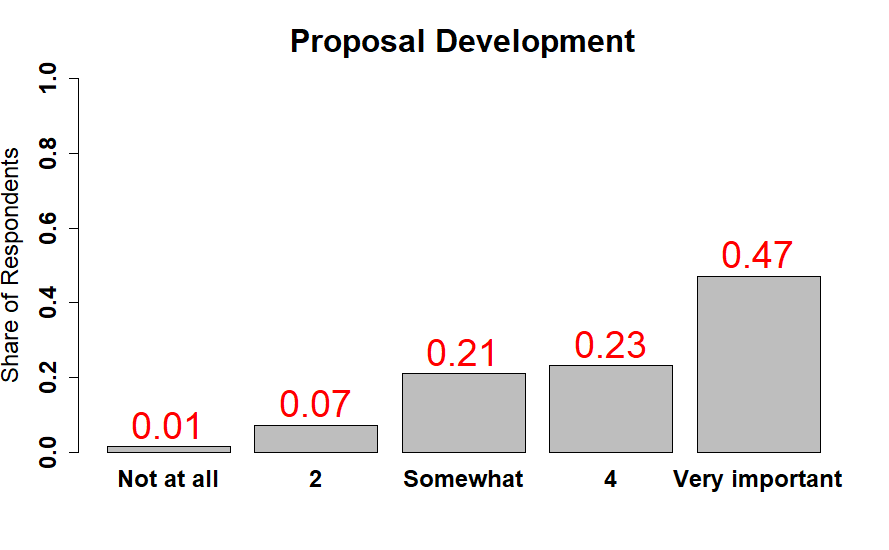
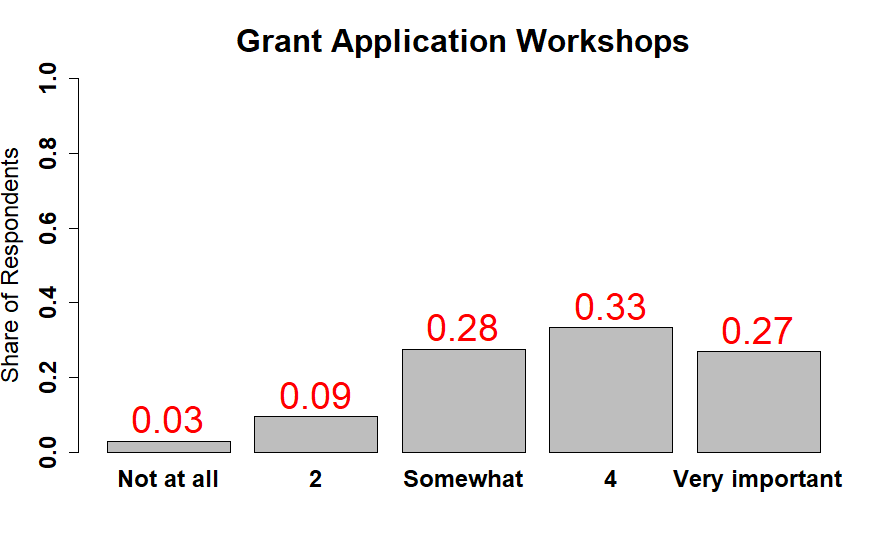
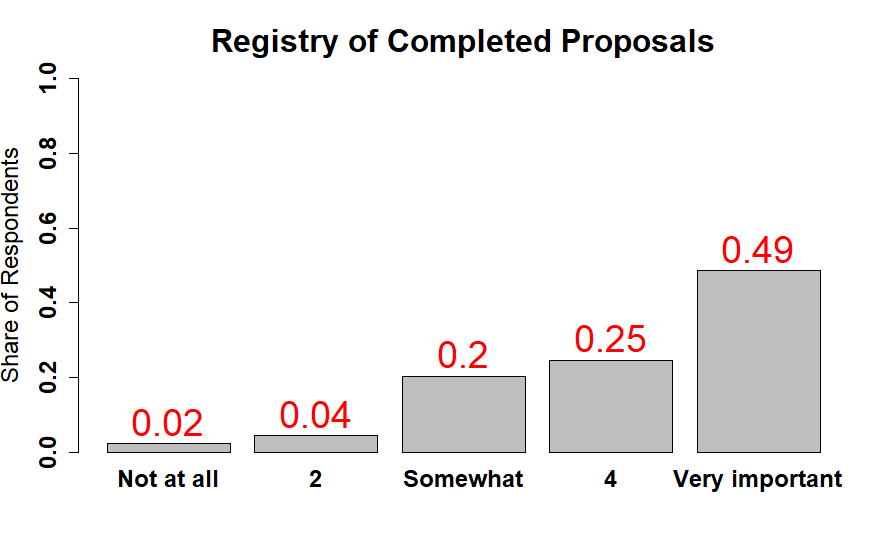
Figure 3. The share of respondents who ranked the importance for each proposal support area from “0 = Not at all important” to “5 = very important”.
IV. Community Engagement
Faculty were also asked to rate the importance of facilitating engagement between social and behavioral science faculty and local NGOs/non-profits. As shown in Figure 4, 59% of the respondents rated “facilitating community engagement” as very important or important and 18% as not important or not at all important.
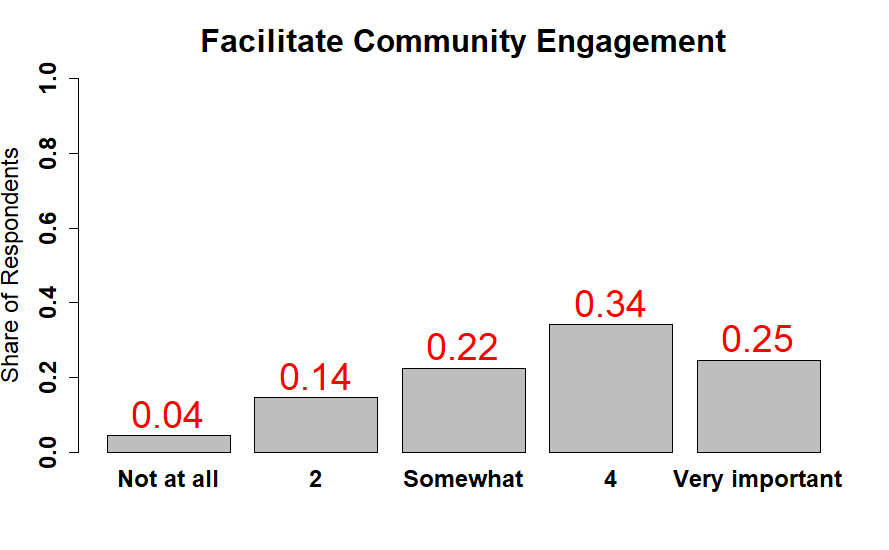
Figure 4. The share of respondents who ranked the importance for community engagement from “0 = Not at all important” to “5 = very important”.
V. Most Important Priorities
Taking the information from the previous responses, the top five goals considered to be the most important (i.e., largest share of important and very important responses) for CSBS are as follows:
- Provide seed funding to collect pilot data (88%)
- Help identify grant proposals (77%)
- Mentor new faculty on the grant proposal process (77%)
- Help faculty find interdisciplinary collaborators on campus (75%)
- Create a registry of completed grant proposals to use as examples (74%)
VI. Least Important Priorities
The following were found to be the least important goals (i.e., largest share of not important and not important at all responses) for CSBS:
- Facilitate engagement between faculty and local NGOs/non-profits (18%)
- Facilitate a mentee-mentor program for seeking external funding (16%)
- Cultivate research teams to apply for large funding mechanisms (12%)
- Conduct workshops on how to apply for NSF, NIH and other federal grants (12%)
- Bring funders to campus (9%)
- Help with proposal development (8%)
VII. Other Priorities
Respondents were also given the opportunity to list other possible goals for CSBS. Some examples of these other goals included “drop in office hours for faculty wanting help with proposals or other research related needs,” “facilitate links with private foundations,” and “provide a mechanisms for external disciplinary reviews of proposals before submission to sponsor, assist with the recruitment of study participants.” All these responses can be found in Appendix A.
Past Experiences with CSBS
The second section of the survey asked social and behavioral science faculty about their past experiences working with the SBRI, now the CSBS. Specifically, faculty were asked 1) if CSBS had helped the respondent, 2) if the respondent had asked for help from CSBS but CSBS was not useful, or 3) if the respondent had not asked for help from CSBS. Responses to this question indicate that while 20% of faculty reported that CSBS has helped them (n=27), 70% of faculty reported that they did not ask for help (n=103), and 10% of faculty reported that they asked for help, but CSBS was not useful (n=8).
Of the respondents who reported that CSBS had helped them in the past, they were further asked how CSBS has helped them. Overall, what was generally mentioned was that CSBS had helped by providing seed funding, assisting with proposal development, helping identify funding opportunities and collaborators across campus as well as by hosting methods and collaborative/interdisciplinary workshops. The quote below provides a great example of all the themes mentioned in these responses. See also Appendix B for the complete list of answers.
“Seed funding through the SBSRI. Connections with funding opportunities on campus. Information about external funding opportunities. The workshops on intersection between social behavioral sciences and engineering and multilevel modeling (Lesa Hoffman).”
Those who reported they had asked for help and found CSBS to be either useful or not useful were then questioned on how CSBS can improve. The main themes from these responses include giving feedback on research proposals, providing examples of past submitted proposals, facilitating a mentor-mentee program for faculty, and helping develop further connections with potential collaborators and with external funding opportunities. Others also commented on their difficulty of getting a spot in the methods workshops as well as the need of offering methods workshops at multiple levels of research. Some examples of these quotes are included below. See Appendix B for the complete list of answers.
“Successful example grants of various types”
“More opportunities for interacting with other CSBS members on campus, to take advantage of grant opportunities together”
“Continue offering information on grant opportunities and facilitating research collaborations to create teams with similar interests to apply for grants”
“Offer workshops aimed at multiple levels of researchers; it feels like there is a focus on beginners, and some of that help duplicates what is already offered in colleges and some departments”
“Offer feedback on proposals we submit for internal funding”
CSBS Communications
The next section of the survey asked social and behavioral science faculty about what information would be useful on the CSBS website. While the answers were very diverse, some of the most recurrent themes included providing funding opportunities (internal and external) and examples of submitted grant proposals, advertising workshops and seminars as well as facilitating collaboration opportunities and networking tools and highlighting affiliated faculty and their research areas. Some examples of these answers are below. Additional examples of what faculty would like to see on the CSBS website can be found in Appendix C.
“Grant opportunities, researchers looking for collaborators, a calendar of seminar and colloquium talks on campus that are of interest to SBS faculty and students”
“I like the idea of a registry of funded research as well as opportunities for federal funding in different areas of social/behavioral research; links to “meeting groups” geared toward certain proposals/topics”
“Research talks that are accessible to a broad audience, and that might lead to new collaborations. Opportunities for people to meet and learn about each other’s research”
“Interdisciplinary funding opportunities; a cross-campus directory of affiliated faculty with keyword interests”
Additionally, the survey also asked how faculty would like CSBS to communicate with them about funding opportunities, workshops, upcoming events, news, etc. The highest response was emails (as needed through the listserv with occasional individual emails) (74%), followed by newsletter (51%), website (41%), Twitter (9%) and other (4%). Answers to the “other” option included:
“Brown bags or some kind of regular meeting for new faculty” and “Slack”
“I think a “digest” approach would be good. It lets people sign up and control how frequently they get news/info from CSBS. Once a week, as things come up, 2x/month, etc.”
Research Interests
In order to better match funding opportunities with faculty’s research interests, respondents were also asked to select which CSBS grand challenge–solving poverty, understanding the effect of the digital revolution on society, the role of social and behavioral factors in health–best fits their research interests. As depicted in Figure 5, the largest share of respondents chose the health grand them (53%), technology was second with 41% of the respondents, and poverty was last with 20% of the respondents, 21% of the respondents also selected other as their area of research.
In terms of funding, faculty were asked to identify external funding opportunities that they are interested in pursuing. A wide range of funding agencies were listed such as federal agencies (e.g. NIH, USDA, NSF) and foundations (e.g. Robert Wood Johnson Foundation, Russell Sage, Gates Foundation). For more information about faculty interest in funding opportunities, refer to Appendix D.

Figure 5. The share of respondents who selected on of the three CSBS challenges or other.
Engagement In Other CSBS Activities
In the last section of the survey, social and behavioral science faculty were asked what other activities CSBS could implement to serve the CSBS community. These activities included 1) a mentee-mentor program for seeking external funding opportunities, 2) a grant proposal writing group, and 3) an advisory program to non-profits and NGOs in the Champaign-Urbana community.
With regards to the mentee-mentor program, 11% of respondents said they would like to be a mentor and 42% said they would like to be a mentee. For grant proposals, 56% of the respondents indicated they would like to join a grant proposal writing group. Lastly, 42% of respondents said they would be interested in serving as an advisor for non-profits/NGOs in the Champaign-Urbana community. Further, the survey asked respondents, who were interested in serving as an advisor, in what capacity they would like to serve as. In general, responses included impact assessment/evaluation, strategic and program planning, survey design, and literature review. Some respondents also indicating their willingness to help with whatever was needed. Detailed information about how faculty would like to serve as an advisor for non-profits/NGOs can be found in Appendix E.
Who Participated In The Survey
As mentioned previously, this survey was sent to 1,691 social and behavioral science faculty in 49 academic units and 12 colleges. The response rate was low with a total of 138 responses, representing 41 units and the 12 colleges/schools; of those 40% were female and 34% were male. The majority of responses came from professors: 27% of respondents were full professors, 17% of respondents were associate professors, and 22% of respondents were assistant professors. The other responses came from other faculty (10% of respondents) and academic professionals (2% of respondents).[2] Additionally, respondents were asked to report how many years they have been at the University of Illinois Urbana-Champaign (UIUC). The majority of respondents have been at UIUC between 5 and 20 years (43%), with 23% between 5 and 10 years and 20% between 11 and 20 years. Around 23% respondents also reported being at UIUC for less than 5 years. Few reported to have been at UIUC for more than 20 years (11% of respondents).
Appendix A
Other goals CSBS should prioritize to help our community:
“Always incorporate non-tenure track (non-Research focused) and clinical faculty in all activities. Perhaps offer workshops for clinical faculty and tenure-track faculty can collaborate”
“Broaden scope of research to include global actors/funding mechanisms”
“Coordinate researchers to pool funds for computing resources”
“Drop in office hours for faculty wanting help w grant proposals or other research related needs”
“Facilitate access to equipment and resources so we can make small grants go farther. Example: eye trackers on campus that could be used for research, hence no need to budget for one in a grant proposal”
“Facilitate links with private foundations”
“Help specialized faculty with all of the above, too”
“I am a communication scholar but not in the communication department. There is limited space for those who do qualitative empirical inquiry. Support for this would be great”
“Methods workshops”
“Provide a mechanism for external disciplinary reviews of proposals before submission to sponsor; assist with the recruitment of study participants”
“Work to establish access to fair and equitable grant management within LAS”
“Would be helpful to assist researchers in obtaining foundation and donor support, since government funding is low in the social and behavioral sciences”
“Would like to see more opportunities for faculty not conducting research around mentorship, collaboration on and off campus?”
Appendix B
How CSBS has helped you in the past:
“Seed funding though the SBSRI. -Connections with funding opportunities on campus. -Information about external funding opportunities. -Workshop on intersection between social behavioral sciences and engineering (and follow-up meeting). -Workshop on multilevel modeling (Lesa Hoffman)”
“Applied for and received seed grant as part of a team”
“Assist in the application process”
“Awareness of campus and broader opportunities for funding”
“Connect with other faculty across campus”
“Facilitated initiation of collaborations and project development”
“Funded a seed grant”
“Funding”
“Grant proposal support. Team formation support. Opportunities for seed funding (we haven’t applied but it’s incentivized some conversations about team formation). Awareness of funding opportunities & targeting them for my research program”
“I’ve attended a couple of the research talks and signed up for one of the workshops but couldn’t attend because my son was sick that day. I really like the recent seed grant CFP. I used something like that at a previous university as the basis for future grant proposals”
“I attended a group that I think was funded by CSBS. It was for meeting other researchers on campus, organized by a Research interest. I met faculty in other colleges and have now published with them on interdisciplinary research. I wish there were more things like that to meet other researchers around broad topics”
“I have applied for an NIH grant and the CSBS staff helped with proposal preparation. These extra eyes were very important for the success of the grant”
“I recently helped to write and submit an NSF grant proposal for the first time (for myself). The staff at the CSBS managed a lot of first-time submission information for me”
“I was part of a faculty team that was awarded a seed grant from the precursor to CSBS”
“Organized useful workshops and seminars, which I attended. Arranged for a funding agency to visit campus and scheduled a meeting on my behalf”
“Pilot grant awarded”
“Provided seed funding”
“Spurring development of interdisciplinary partnerships”
“Supported a pilot project for interdisciplinary research team that now seems likely to be funded by NICHD (council decision pending)”
“Susan has been a tremendous help to me to identify research funding opportunities, facilitate research program development, and support funding application processes. Brent has also helped increase the visibility of our research team and facilitate the grant application process. As a junior faculty, I really appreciate the guidance of CSBS”
“Susan has facilitated meeting for our interdisciplinary group to brainstorm and implement grant proposal ideas”
“The CSBS provided seed funding for our team to collect pilot data necessary for a grant submission”
“The training opportunities have been great”
“The workshops are helpful and informative”
“Through valuable guidance and pilot funding. Thank you!”
“Workshop by Viechtbauer on meta-analysis using the R metafor package helped me conduct 2 meta-analyses, and also work more effectively with my meta-analyst”
How CSBS can improve to help you:
“As specialized faculty, I have limited eligibility which is making my research progress difficult. More assistance with how to navigate this and/or creating more opportunities for specialized faculty would help a lot.”
“I’ve attempted to participate in workshops, but always been waitlisted.”
“It would be great if CSBS would be more inclusive and expand beyond just a few narrowly targeted areas of the social and behavioral sciences. There can be the appearance of favoritism towards researchers working in certain areas and departments.”
“Offer feedback on proposals we submit for internal funding.”
“LAS and grants is like a dog chasing a car: all energy is spent running after something (seed money, grant applications) while a parked car (i.e. fully funded projects) is of no interest, save stealing the hubcaps of overhead.”
Respondents that indicated CSBS had been useful in the past:
“After CSBS reviewed proposals, may PIs have written, detailed feedback and comments on the proposals?”
“Bringing researchers across different disciplines together by their common interest in some cutting-edge research areas”
“Continue offering information on grant opportunities and facilitating research collaborations to create teams with similar interests to apply for grants”
“Continue to find ways to support graduate student goals”
“Honestly, I feel like the CSBS is pretty welcoming already. I really appreciate support for learning about grants, finding examples of prior successful grants, and working through the submission process”
“I’d love to meet 1-1 with CSBS staff so we can better get to know each other, what I’m working on, and how CSBS can help”
“I am satisfied so far”
“I spent three years as a faculty member at Texas Tech, before I moved here. One thing that they did that was helpful for faculty like me who were in fields where grant funding wasn’t emphasized is that they facilitated connections between senior faculty who had received grants with those of us who were new to the grant game. (This is probably similar to the mentor-mentee item on the first page.). Anyway, that program led to the first NSF grant proposal that I was on”
“I think some of the workshops I’ve been interested in have filled up quickly (which is good!). I’d love to have some kind of social event to connect with other researchers and invested people on campus”
“It has already helped in many ways; I believe that continuing to foster multi-disciplinary research and innovation, and providing examples of funded work in different areas, would be helpful”
“It would be great if CSBS can support or facilitate mentor-mentee teaming for junior faculty to receive guidance on the development of research programs and grant applications (especially for the behavioral scientist who is not in the departments of traditional social and behavioral sciences)”
“Let Brent be Brent. The suits are keeping him down. Don’t permit the bean counters to stifle his creative approach to leadership”
“More opportunities for interacting with other CSBS members on campus, to take advantage of grant opportunities together”
“no specific suggestions; just keep doing what you’re doing!”
“Offer workshops aimed at multiple levels of researchers; it feels like there is a focus on beginners, and some of that help duplicates what is already offered in colleges and some departments”
“Prioritize funding opportunities and networking opportunities for advancing connections on campus between social scientists and data scientists, particularly around data science resources that are unique to campus and that could be used as a basis for going after competitive external funding”
“Successful example grants of various types”
“Targeted efforts toward particular faculty”
“The idea of bringing together teams to apply for larger grants sounds useful, and bringing people from funding agencies to campus is also useful”
“Through facilitating further connections with potential collaborators and funding agencies”
Appendix C
Information or resources you would like to see on the CSBS website:
“-funding opportunities -training/workshops opportunities (on and off campus) -new initiatives on campus -community engagement opportunities (not sure what this would look like, but I think it’s great idea to have support for researchers to carry out “broader impact” activities/events)”
“1. Laboratory resources available for SBS resources, including lab animal care facilities; service labs for organic molecular characterization and genome sequencing labs; cellular imaging; biomedical mass spectrometry, etc. 2. list of titles of previously funded SBS research, with identification PI and PPs and their unit affiliations. 3. Information on internal and external funding opportunities”
“A clearer understanding of how junior faculty can interface with CSBS”
“A list of affiliated faculty members and their research areas”
“Affiliated faculty across campus, indexed by area of interest and expertise”
“Affiliated faculty seminars”
“An “expertise lookup” that aligns interests across the social sciences around a common set of thematic labels, so it is easier to identify potential collaborators or network opportunities”
“Broader emphasis on the social and behavioral sciences. More inclusive opportunities for researchers to connect with one another. And not just in health, nutrition, and psychology”
“Calendar of upcoming talks. Make funding info easier to find”
“Calls for research engagement; latest rfa’s; tips/strategies for various research challenges; how to videos or strategies for grantsmanship, participant recruitment, working with various common stakeholders”
“Campus events, funding resources”
“Collaboration opportunities”
“Collaborations. Funding opportunities. Training events”
“Current research interest of involved faculty members”
“Didn’t know you had a website”
“Don’t have time to elaborate right now”
“Events and registration information, what resources are offered”
“Example proposals”
“Examples of documents (e.g., grant applications, white papers, registered reports) that scholars create”
“Funding opportunities”
“Funding opportunities meetings of research teams that are open to other faculty”
“Funding opportunities Speakers talks”
“Funding opportunities, news/events, resources”
“Funding opportunities, opportunities for collaborating on scholarly publishing, conference announcements, fellowships, scholarships, internships, mentoring opportunities, professional development opportunities”
“Funding opportunities, recently awarded social and behavioral sciences-related grants/research programs”
“Funding sources”
“Funding updates”
“Funding, workshops, networking events”
“Grant and training opportunities”
“Grant deadlines”
“Grant info related to my topics of research”
“Grant information, networking information”
“Grant opportunities and deadlines, CSBS resources for grant preparation help, relevant faculty profiles”,
“Grant opportunities. Announcements about talks and research seminars, especially around research methodology”
“Grant opportunities, faculty affiliates, data sources”
“Grant opportunities, researchers looking for collaborators, a calendar of seminar and colloquium talks on campus that are of interest to SBS faculty and students”
“Grant sources”
“Grant writing help”
“Grants”
“Grants and workgroups”
“Grants announcements, connections with NSF and Foundations, potential for collaborations between social scientists and engineers to address critical societal issues”
“Grants, seed funding, esp. for specialized faculty”
“Honestly the big thing I need these days is to have my teaching reduced and more money to do my work. I don’t need any other types of resources”
“I’m honestly unsure what is there currently and will go check it out to learn more about what exists”
“I am not sure”
“I can’t think of anything beyond what is currently on the site”
“I don’t have any suggestions”
“I don’t know”
“I feel like the website generally has what I need to know? I haven’t run into a situation in which I haven’t been able to find the information I needed there”
“I like the idea of a registry of funded research as well as opportunities for federal funding in different areas of social/behavioral research; links to “meeting groups” geared toward certain proposals/topics”
“I prefer email”
“I prefer to check the emails than visit the website”
“I wish I could learn more about how to support grants that involve collaboration within the same department/college. I know this sounds like we’re “thinking small”, but there isn’t enough infrastructure to support intra-college collaboration at this time”
“Information about internal and external grant opportunities of interest”
“information about resources for SBS research”
“information about teams/issues that are forming”
“Information about what is available at UIUC and easy way to find collaborators at UIUC”
“Information bites (results or ongoing) about local or smaller scale studies. We pay so much attention to grand scale efforts, yet grass roots efforts are just as important and impactful. If we can showcase more of these, it reminds us that our ideas are worthy of exploration and we might pursue them on any scale”
“Information on funding or grant application for new faculty”
“Interdisciplinary funding opportunities; a cross-campus directory of affiliated faculty with keyword interests”
“Internal and external funding opportunities”
“Internal funding opportunities, lists of research methods courses that are open to students from multiple departments”
“Internal/external funding opportunities. Info about affiliated and other research group/researchers”
“It seems fine as is”
“It would be interesting and useful to see a cluster analysis of faculty in the social and behavioral sciences. It would be informative to see the various clusters that emerge and the individuals who populate these clusters. You could make clusters based on independent or dependent variables or by methodologies, or populations of interest. Making these clusters would be a great service as we begin to get a better picture of who we are as a group of scholars”
“Its services, staff, and contact information.”
“Just found the external funding resources – these are GREAT. I’d love to see more like this and perhaps an overarching calendar of future deadlines”
“Latest publications by affiliated faculty. Examples of grant projects that have been funded and their progress.”,
“Link to Tim Tufte- we already have adequate grant proposal development help – don’t recreate the wheel at CSBS. State a clear college policy on return on overhead for PIs. Have a chart clarifying what services the College provides full overhead grants and who the contact person is for each service”
“Links to funding sources for UIUC faculty, staff and grad students — repository of successful grant proposals data library or links to data sets available for secondary analysis collected by UIUC researchers on social science topics, especially community and household level surveys”
“Links to information and resources available both internally and externally”
“Links to wide range of material on quantitative methods at all levels – from first-time quantifiers to advanced data researchers structured bibliography of material on quantitative methods”
“List of affiliated faculty with research interests. List of fellowship and grant opportunities”
“List of affiliates. Key granting agencies in different areas. possibility of gaining access to successful proposals”
“List of campus events relevant to SBS”
“Listing of grant opportunities and federal/private agencies and foundations. Listing of faculty”
“Lists of faculty, fellows and graduate students. Links to grant opportunities”
“Mainly funding and training opportunities”
“Matchmaking services for partnerships between faculty”
“More detail about internal competitions and related, smaller scale opportunities, collection of links to related university labs, etc.”
“More detailed information about how small grant proposals are evaluated and handled. For example, grant proposal deadlines (if there are any regular cycles), how review panels are selected, if a research team didn’t get an award, can they apply next time with the same project? and etc.”
“More information on grant opportunities and support provided for applying”
“New calls for research proposals”
“Not interested in the website”
“Not sure”
“Not sure what is there now”
“Open grant calls, information about interdisciplinary research teams including those that are seeking additional faculty with certain areas of expertise/knowledge, sample proposals, guides for how to complete portions of grants correctly”
“Opportunities for collaboration with other behavioral scientists, either in teams or individually. Also, announcements of talks and seminars/workshops of interest”
“Opportunities for funding”
“Opportunities to become involved in projects that may emanate from information technology or business areas. So much technology and business model research is being conducted in a “soulless” manner, impacting social science areas but without the social science background to put it in context. This center could help bridge the gap”
“Options for visiting and specialized faculty”
“Participating faculty and their research interests”
“Perhaps the only thing missing might be links for faculty and graduate and undergraduate students interested in non-academic jobs and/or collaborations”
“Possible grants, by discipline or field of study”
“Potential grants”
“Professional and career development opportunities or pathways for clinical faculty”
“Relevant events, news about Center activities, description of associate faculty research interests”
“Research talks that are accessible to a broad audience, and that might lead to new collaborations. Opportunities for people to meet and learn about each other’s research”
“Researchers in this area, grants that have been funded to Illinois in these areas, ways to collaborate and bring people together”
“Resources available – programs and events, even webinars and brown bags are helpful – ways to create community and value (for research pursuits) would be good (maybe an “ask the expert” column via the website?”
“Resources for research development, execution, and funding”
“Resources pertinent to the first set of questions you posed re: priorities”
“RFPs”
“Sample grant proposals”
“See responses to priorities”
“Seeding funding opportunities”
“Seems fine”
“Services provided… Examples of different stakeholders and how CSBS can help different stakeholders achieve their goals”
“Some type of tool to help connect with scholars working on similar issues from diverse disciplinary perspectives”
“Specific services and contact information for the staff working on those services”
“Successful applications (netid protected) – similar to grad college thesis examples”
“Support to seek funding for approaches that can be used in the classroom or labs”
“The CSBS needs to help with two things: 1) grant facilitation – getting grants together and out the door. Our rate of grant submission in social science is too low. and then 2) provide some strategic direction for social science (including hiring) on the campus”
“The grant funding/application resources mentioned on page one would be so helpful where applicable on a website”
“The problem with the OVCR e-mails is all of the science / engineering grants that are not applicable to me, so I can imagine CSBS curating grant listings a bit more”
“The website currently has three thematic groups that I see under Research Areas. It might be beneficial to have methodologically focused research groups as well (e.g., social network analysis, survey research methods) based on the strengths at UIUC. These methods areas often intersect with topical areas (e.g., networks + social determinants of health), fostering collaborations”
“The website is fairly good as is”
“Tips for conceptualizing research projects Help in managing labs (equipment and personnel) Grant opportunities”
“To be honest, I’ve never visited the website”
“Transdisciplinary speaker series”
“Upcoming Events, Key Research Affiliates with research profiles and current interests”
“Upcoming talks and workshops, information about collaborative projects, perhaps a list of projects looking for collaborators or researchers interested in collaborating?”
“Update on potential opportunities for grants”
“Updated accomplishments”
“What you have above — information about grant opportunities”
“What you have now is fine for me”
“Where to go for help on explanation of services funding opportunities”
“Workshops, grants, research areas, research program and mission, values, information on best practices in social and behavioral research (incl. privacy and data handling)”
“Workshops, speaker series, grant opportunities and other news related items”
Appendix D
External funding opportunities interested in pursuing:
“Private foundation grants that complement the programming and work I do in my AgReach www.agreach.illinois.edu program with our staff team, other research grants from USAID, Gates Foundation, DFID etc”
“Any and all! Federal or foundation”
“Any by federal or state government including SAMHSA, NIH, NIMH, NIDA. Foundation funding such as RWJF”
“Anyone! As a clinical faculty not conducting research, I am hoping to find new opportunities to get funding support in the classroom as well as with some ideas for community collaboration ideas I have through our Community Learning Lab”
“Charles Mott Foundation, Teagle, Spencer, and Lumina”
“DOD, IARPA, NSF, NEH, Sloan Foundation, Knight Foundation”,
“don’t need funding”
“Epigenetics of behavioral neuroendocrinology. Epigenetics of hormones relating to bone mineral homeostasis”
“Foundations interested in mental health – especially depression NIMH/NIH\NSF – Social Science”
“Future of Work at the Human-Tech Frontier, Cyberlearning, NRT (all NSF), Army or Navy funding is also a possibility”
“GATES, spensor, ford, NIH, NSF, RWJ, russell sage, etc.”
“HEAL Initiative/HBCD Phase II funding; NIMH R01 (investigator-initiated)”
“Health Resources and Services Administration (HRSA) USDA Rural Health and Safety, Robert Wood Johnson Foundation, Retirement Research Foundation, Grantmakers in Health, Grantmakers in Aging (these are associations with members who are in the grant-making business- they set priorities together and coordinate. We need a pulse on these organizations. They have conferences. We need to tap into them. They are change makers and we need contacts with them. The foundation game is highly political, so other avenues to build awareness of our scholarship/research and ways to increase our visibility is paramount to success with foundations. This is an area I am personally interested in because I have gotten quite a bit of foundation funding in the past”
“https://gcgh.grandchallenges.org/challenge/voices-economic-opportunity
https://sloan.org/grants/apply
http://www.russellsage.org/research/pipeline-grants-competition”
“I’m interested in pursuing funding through NIMHD, NICHD, Spencer Foundation, and WT Grant Foundations”
“I’m interested in research with very practical application to professional practitioners whose organizations mainly are willing to pay only for technological or business model advances, but the people proposing such things lack the disciplinary knowledge of the applied area to make their projects as practical as needed. My hope would be to help guide some of those projects into the most potentially productive areas”
“I don’t even know what is available”
“I have been interested in the National Endowment for the Arts and the National Endowment for the Humanities grant funds. Since I technically work in both arts and education (music education is my field), it is difficult to find funding from both of these organizations. According to the Vice Chancellor for Research Office faculty, NEH really only funds true humanities research, so education research is not something they are interested in funding. NEA is more in line with my research interests, but has fewer funding opportunities and difficult parameters on some of their grant funds (e.g., assessment outcomes from students that would be difficult to measure in terms of my research interests, funding of big tech initiatives that in my opinion, are often more for show and have limited impact or are difficult to use in different music classroom settings, etc.)”
“I have no idea what is out there that is relevant”
“I have seed funding through McGill to develop a proposal for an SSHRC grant in this area”
“I keep my eyes on calls from EGAP, International Growth Center, USAID, USIP, NSF, IPA”
“I would also like to see some support for external fellowships as well but – Data & Society for example, support from Hewitt Foundation, SSRC, etc.”
“I would like information about opportunities”
“IMLS, NEH”
“Most of my past funding opportunities have come in the form of gifts from businesses and non-profit agencies to conduct my research”
“National Institute of Mental Health”
“National Institute on Aging, NIH”
“NICHD R03 (August 2020) NSF (August 2020) MINERVA (have currently, will be applying for complementary funding in 2021)”
“NIEHS, CDC”
“NIGMS, NSF”
“NIH”
“NIH (for basic research), NIFA (for applied programming)”
“NIH or possibly one of the federal agencies, such as FDA”
“NIH, APA”,
“NIH, NSF, IES”
“NIH, NSF, NIDILRR — The National Institute on Disability, Independent Living, and Rehabilitation Research PCORI”,
“NIH,”
“NIH, DOJ”
“NIH, NIA and foundations”
“NIH, NIDCD”
“NIH, NIJ, CDC”, “NIH, NSF”, “NIH, NSF, ACS (American Cancer Society)”
“NIH, USAID, UNICEF, Robert Wood Johnson Foundation. I am also interested in rapid response grants because my research focuses on mental health interventions in disaster recovery”
“NIH: NIMHD, NIMH, NIDA, NIAAA Foundations Private/corporate donors”
“NIH; pediatric obesity; gut-brain-emotion associations, NSF; social relationships and learning, RWJ; health disparities”
“NIMH Brain and Behavior Research Foundation, NSF”
“NIOSH, NSF (Social and Economic Sciences), NIH”
“none (I’m retired)”
“None at the moment”
“None of these three match my current interests”
“Not sure”
“NSF”
“NSF-SES, NSF-BCS”
“NSF CISE – Cyber Human Systems NSF – SBSRI – STS”
“NSF convergence & other NSF proposals, private foundations, potentially, like Gates, Ford, etc.”
“NSF for their smart communities programs, NIH and NIMH for their interests in how mobile apps might give us new insights into health and wellbeing”,
“NSF has initiatives relevant to understanding the effect of the digital revolution on society”,
“NSF Perception/Action/Cognition”
“NSF, Gates, USDA?”
“NSF, NIH”
“NSF, Department of Defense, Carnegie”
“NSF, IES, NIH”
“nsf, neh, ford, spencer”
“NSF, NIH, NMSS, DOD”
“NSF, NIH, Private Foundations (Ford, Mellon, Sage, etc.).”
“NSF, NIH, Sloan, etc.”
“NSF, Russel Sage Foundation”
“Opportunities related to research on racial trauma, racial stress, matriculation of Black male students in higher ed,”
“Pretty much any that fit the category”
“Robert Wood Johnson Foundation, Volvo Foundation, US Dept of Transportation (DOT), Illinois DOT”
“Rockefeller Foundation, Kauffman Foundation, NSF”
“Russell Sage Foundation, National Science Foundation, Carnegie Foundation”
“The funding agencies most related to my work are NSF, IMLS, and Spencer.”
“USAID Development Innovation Ventures, Jacobs Foundation, Gates Foundation, NSF, UKAID Ed Tech Research Hub”
“USDA, NSF, USDOI”
“WT Grant Institutional Challenge, Spencer Foundation”
“WT Grant, IES, Russell Sage, Spencer, NSF”
“WT Grant, NIH, NSF, Spencer, Russell Sage”
Appendix E
I would like to serve as an advisor to non-profits and NGOs in the Champaign-Urbana community in the following capacity:
“All”
“Although I have been at the university for 23 years, I have decades of prior experience as a professional practitioner and remain active as a community newspaper owner and publisher and formerly as online publisher of a magazine. For the right group, I can help bridge the divide between the academy and the industry”
“Anything….I have reached out the Champaign County Planning Commission for example – they need a social scientist to review their surveys. As a faculty Extension Specialist, I do a lot of this type of work already and like staying involved”
“As needed”
“Assessment/Evaluation, strategic planning”
“clinical consultant”
“General guidance to youth serving organizations (including libraries and after-school services), support for planning and implementing programs and services”
“Helping them with knowledge of technology and using technology to overcome some resource challenges. Impact Assessment and Literature review would be additional ways as well”
“Honestly, I should say no to this like the other ones. I am so overwhelmed w service at this point that I don’t even have time for my own research, much less learning how to write large scale grants. I volunteer w local nonprofits so keyword I should leave it at that”
“I’d be happy to help with program evaluation, use of data to inform interventions, and assist with statistical analysis”
“I’m happy to help in any capacity although my time is very limited this year”
“I’m not sure but it interests me”
“I am happy to pitch in in any way that is needed. I have a lot of skillsets that could be useful”
“I have been providing environmental law and policy advice to non-profits and NGOs, including with the assistance of law, public health and undergrad students”
“I have collaborated with several for profit organizations on designing field experiments and surveys, formulating research questions and analyzing data to solve their business problems. I would be more than happy to help non-profit organizations answer their questions by helping them design studies or analyze the data they have already”
“I may be able to offer helpful feedback and insight on mediated campaign messages”
“i think it would very much depend on the nature of the non-profit organization”
“I worked in fundraising and donor relations for about 13 years before going to graduate school, but I don’t want to get back into fundraising. But I’d be interested in impact assessment and/or helping to understand how to use websites and social media to engage publics and stakeholders”
“I would be happy to serve in this capacity depending on the direction that CSBS takes in the future”
“Impact assessment”
“impact assessment, literature review”
“impact assessment, literature review, advisory committee”
“impact assessment, literature review, research collaborations”
“Impact assessment….”
“impact evaluation; possibly literature review”,
“lit review, training”
“Lit review; design advisor”
“Literature review”
“Literature review and methods”
“Literature review and strategy planning”
“Literature review, possibly impact assessment, design phase and implementation advisor”
“literature review, data analysis”
“Literature review, program design”
“Literature Review, Review of small scale grant proposals”
“literature review; collaborating on projects”
“long-term partnership”
“No idea need more info but would like to start helping community”
“Not sure of the options…”
“Not sure what the opportunities are but I would like to know more about how I might be most helpful”
“not sure!”
“Not sure. It would depend on needs. I could likely help with evaluating research quality when an NGO is considering adopting a new program or curriculum”
“Perhaps data gathering/analysis? I’m not entirely sure of the different areas in which my advice might be useful, but I’d be more than happy to consider possibilities”
“program evaluation, community engaged research”
“reader and critic; literature review; methods”
“Strategic planning (as a graduate student, I used to support the strategic planning process for the Red Cross in Boston and design initiatives for New Americans)”
“Technical assistance for international interventions (via our own non-profit, Akelos)”
“Unclear”
“understanding information needs; communicating and sharing results”
“Whatever is needed”
“Working with University-based research teams, impact assessment, dissemination plans”
Appendix F
Please share any additional comments you may have:
“Although I am a senior faculty member, I have never applied for a grant (but I would like to in the future). So, mentoring needs may not be limited to junior faculty”
“Don’t make all your survey questions required. Market your mission better”
“Given the relative ubiquity of media use and the extent to which questions of media use intersect with traditional social/behavioral science disciplines, I would love to see an expansion of media-related opportunities. Having said that, I’m sympathetic to resource limitations and the impossibility of pleasing everyone. I’m quite pleased with the success of the CSBS thus far and appreciate the effort that has gone into launching and sustaining it. Thank you for soliciting our feedback”
“Good luck! Great to have CSBS on campus”
“I’m already on your mailing list, I assume…”
“I am a communication researcher. A social scientist but not a behavioral scientist. Not a humanist either. It is very very hard to find which external grants to apply to”
“I am glad that there is a resource such as the CSBS at this university”
“I am interested in serving as a mentor or mentee for anything you have going on”
“I am only peripherally involved in the social and behavioral sciences, and hence my answers are probably not as helpful as others”
“I appreciate all the CSBS is doing to promote and facilitate research at the University”
“I can’t commit to additional activities at this time (mentoring, proposal writing group) but I have been thinking about opportunities for center grants and will reach out after the winter break (or feel free to reach out to me if this is of interest)”
“I look forward to working more closely with this center in the future!”
“I think the idea here is great, but the very faculty that were not trained in external grants are likely the ones who are not given the time in their expected semester schedules to devote a bunch of time to pre-grant training. Perhaps working on pilot studies as a group would be one way to bring in faculty who don’t have the training or whose fields don’t traditionally get that kind of funding”
“I was not aware of CSBS before this survey email. I am glad to know of its existence”
“I would be interested in each of the things you asked about (finding a research/grant writing mentor, joining a grant writing group, serving as an advisor to an NGO), but it is not a good time in my tenure journey”
“I would love to see this be a space that would also encourage qualitative social science research. Happy to talk more – nusher@illinois.edu”
“In 2014, I retired from the University of Illinois. From 2014 to 2019, I held a distinguished professorship in engineering education at Purdue University. I am now retired from Purdue too. From 2012 to 2017, I served as the editor of the Journal of Engineering Education. I am active in the American Educational Research Association. In the College of Engineering, there is a growing community of faculty and graduate students interested in discipline-based education research in computing and in engineering. CSBS could extend its interdisciplinary research to this community”
“It’s great to have the CSBS as a campus program. Thank you for caring”
“Keep up the great work!”
“Left above blank because I’m already on the mailing list….”
“Love the newsletter idea!”
“Since the University is no longer funding I-Chass, it’s not clear to me how computing needs in the social sciences are being funded. I’ve organized a small cooperative group that combines remaining I-Chass resources with other sources of funds; I don’t know whether there are other parallel groups. In any case, it’s a topic where it might perhaps be useful to share information”
“Thank for these opportunities! In terms of the previous page, I currently have strong partnerships with Unit 4 schools. I am interested in helping the community even more, but I’m not sure what “serving as an advisor to non-profits and NGOs” would entail or if I would be helpful in that capacity. I marked “no” but happy to hear more about it if you think I could assist someone”
“Thank you for coordinating this”
“thank you for soliciting campus feedback!”
“Thank you for your commitment”
“Thank you very much!!”
“Thanks for all that you do and for this solicitation of feedback!”
“Thanks for the survey”,
“Thanks for this. These are important questions and I appreciate that you are asking them, and acting on them!”
“Thanks for your efforts”
“Thanks! This is very important. Without better and more focused social science, our Medical school and university will lose out on a lot of new strategic opportunities”
“Thanks, Brent!”
[1] These 12 included: College of ACES, College of AHS, College of Education, College of Fine & Applied Arts, College of LAS, College of LAW, College of Media, Grainger College of Engineering, School of Labor and Employment Relations, School of Social Work, GIES College of Business, i-School.
[2] Note that although academic professionals were not targeted by this survey, some respondents indicated this position in their respondents perhaps due to the fact that some respondents have multiple appointments as academic professionals and specialized faculty.
